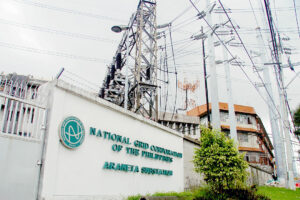By Kyle Aristophere T. Atienza, Reporter
THE PHILIPPINES needs to do more business with new markets to diversify its economy away from China, whose companies have been willing to invest in areas where other foreign entities have not, raising security concerns, analysts said.
The Philippines also needs to solidify its industrial base to climb the global value chain in response to Chinese moves to invest in strategic industries here, they added.
Brian Poe-Llamanzares, a political scientist and chief of staff to Senator Mary Grace Natividad S. Poe-Llamanzares, said China has made “significant investments” in key Philippine industries like electricity, telecommunications, and water, enabled by the absence of competing foreign investors.
“There are only a few investors who are looking at the Philippines, and many of us would question what China’s intention is in investing in these industries,” he said, speaking at a forum organized by WR Numero Research (WRN).
The National Grid Corp. of the Philippines, in which the State Grid Corp. of China has a 40% stake, has been flagged in various Senate inquiries as a possible national security threat.
China claims the South China Sea almost in its entirety, including areas that are well within the Philippines’ exclusive economic zone. Its Coast Guard has been performing dangerous maneuvers and deploying water cannon to block Philippine resupply missions to its outposts in disputed waters.
Under the previous administration, the Philippines welcomed DITO Telecommunity, in which China Telecom has a 40% stake, as a the third player in the telecommunications market.
“In the spirit of a free-market economy and with the lack of competitors, it became necessary to bring in a third telco player that was willing to go through congressional scrutiny and service the unserved and underserved areas,” he said.
“It’s not like DITO was our first choice. It was our only option,” he added. “We were yet to see a serious attempt by any American or European player in the telco market.”
In 2019, DITO and the Armed Forces of the Philippines (AFP) signed a deal allowing the company to build facilities in military camps supposedly to help improve the AFP’s ICT infrastructure.
While the Philippines has been touting interest from other countries in helping build the Philippines’ telco and ICT infrastructure, “very few of them actually have put a bet on the table,” he said.
“A lot of them talk about building relations economically with the Philippines but we are yet to see the fruits of those economic (pledges),” he added, “and this becomes a problem for us because we’re a free market; anyone can come in.”
Mr. Poe noted that under the Duterte administration, China effectively entered the water industry by financing a dam.
He was referring to a $283.2-million loan secured by the past administration from China to build a dam to support Metro Manila’s water needs. Chinese contractor China Energy Engineering Corp. Ltd was selected to build the dam on the Kaliwa River, which straddles Rizal and Quezon provinces.
“We are facing an impending water crisis. And so we’re pushed against the wall and who comes to save the day? China,” he said.
“See if there’s anyone else willing to offer us a loan. No one. And so what happens is, China ends up entering the bid and they get the loan,” he added. “And you can’t fault them for doing it. It’s a free market. They can do it. They can provide it.”
Mr. Poe said Manila needs to harness the potential of its amended Public Service Act, which allows full foreign ownership in key domestic industries, by conducting more road shows overseas.
“It’s really important that we continue to expose ourselves to the international community because we were closed off for six years,” he said. “Next thing is we must create a competitive business climate.”
He noted that red tape continues to be a major concern among investors, limiting the sources of foreign investments. “We need more options,” he said.
He said the Philippines also needs to build industry and make its educational system competitive by “removing the stigma of vocational work.”
Bernardo M. Villegas, one of the founders of the University of Asia and the Pacific and a framer of the 1987 Constitution, said at the WRN forum that the Philippines can only make critical utilities independent from China if it embarks on road shows in more countries including Spain, South Korea, Taiwan, and Japan.
“The only way we can make sure that we declare our independence from China with regard to water and electricity is for us in the private sector to have dozens of road shows,” he said.
Mr. Villegas said expects the planned establishment of a Luzon economic corridor to help the Philippines bag investments from companies themselves seeking to diversify away from China or do business with friendly nations.
The US announced its plan to help establish a Luzon corridor with the help of Japan in April.
The proposed corridor seeks to boost connectivity between Manila, Batangas, and two former US military bases such as Subic Bay and Clark, with a focus on “high-impact” infrastructure such as rails and ports and strategic investments involving semiconductors, clean energy, and supply chains.
China is the Philippines’ largest source of imports and the second-biggest market for exports. The US, on the other hand, is the largest destination of Philippine products and the fifth-largest source of imports.
Mr. Poe said a potential escalation of tensions between the Philippines and China would have little to no impact on the Chinese economy because “what we’re providing them is not critical to China.”
“If they decided to stop trading and buying our fresh fruits and products, then it’s not going to hurt their economy too much.”
“But if we were to develop something more critical — like Taiwan did — an industry that’s indispensable not just to China but also the international community, then suddenly we’re on negotiating terms.”
